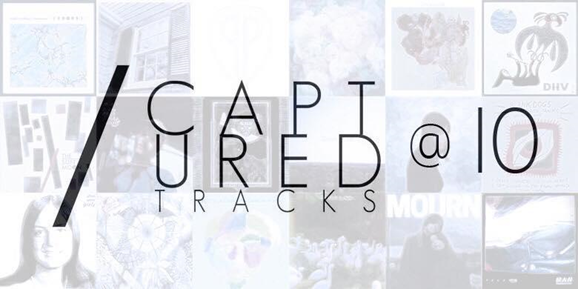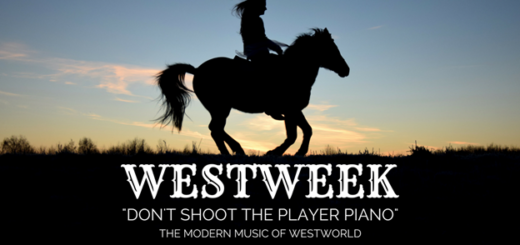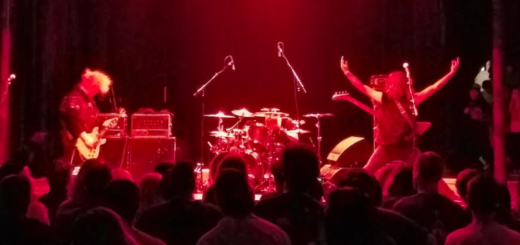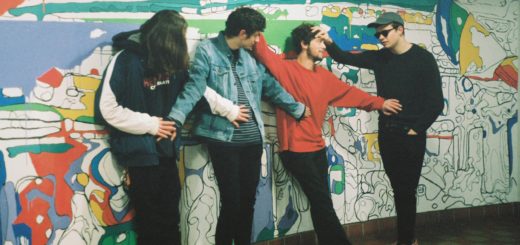Interview: Mike Sniper of Captured Tracks

If you have listened to independent rock music released in the past 10 years and you aren’t familiar with the name Mike Sniper, you’ve at the very least heard a band signed to his label, Captured Tracks. With artists like DIIV, Mac Demarco, Wild Nothing, and dozens of other indie rock institutions on its roster, Captured Tracks is the label behind some of the most influential rock bands of the 2010s. With the label’s 10th anniversary approaching, I was lucky enough to talk to Sniper about his experiences running the label over the past decade.
Ted Davis: I read online that Captured Tracks took its name from a tape by your band Blank Dogs. As a member of Blank Dogs, did you always anticipate that your musicianship would lead to a business, or are you surprised by what the label has become?
Mike Sniper: Musicianship is a very loose word. I already had a record label prior to Captured Tracks, which was a reissue label, so I’d already kind of put out a couple records, and I’d worked at record stores and as a small distributor, so I always had one foot in label-side stuff. I did a lot of art for other labels. I don’t really think that being in the band was something that directly led to it—it was a whole bunch of other factors.
TD: How did you get involved with labels to begin with?
MS: Just a general interest. I went to art school and I had gotten a job at the Dia Center For the Arts pretty much right out of it and I would go to this store Midnight Records on my lunch that was only a couple blocks away. I really wished I worked at the record store instead of the job at Dia Center, and I started working there eventually. It was a record store, but it was also a label at one point called Midnight Records. It was a very niche label and a very niche store but I’d always wanted to work in music and in record stores and stuff like that, so it just kind of all went from there. That’s when I realized most successful record labels are run by people like me and not by somebody who studied the music industry in college.
TD: What do you mean by “people like me?”
MS: People who run record labels. Darius (Van Arman) who runs Jagjaguwar and all the guys that run Matador, they all come from record store backgrounds and stuff like that, not necessarily from studying [the] music industry or anything directly like that. It’s mostly about an ear when you’re working with independent music. You have to be willing to take chances. You have to be a little crazy. It’s all about chances. There’s no mathematical way to figure out if people are going to like music or not when you sign a new artist.
TD: Were you doing music full time before the label, or is Captured Tracks what turned music into a full-time job for you?
MS: I was working at record stores. I was doing design and freelance illustration. I was in a touring and recording band. All at the same time. And I was still working on Captured Tracks for about the first year or so. I would say the second year was when I quit all the other stuff I was doing just to manage my time.
TD: Looking at your release catalogue, it seems like you went pretty hard out of the gate. Releasing albums by Dum Dum Girls, Woods, and Thee Oh Sees on top of your own music in the course of a single year is an impressive feat. Did you ever hesitate signing so many artists at the label’s inception?
MS: No.
TD: You gave it your all from the start?
MS: I think that’s the only way you can have a successful label is to, like, do what we did. We needed to do all those things. We were doing lots of seven-inches and 12-inch EPs. We weren’t doing that many albums until around the third year. It wasn’t so much these long campaigns. That year where we had Beach Fossils’ first album and Wild Nothing’s first album, that’s where it started to become more like a typical campaign around an album. We kind of learned on the spot. We started hiring more and more people and now we release fewer things. We still release a lot but not as much as we used to. That was just a different era. It was an era when I was consciously trying to put out a lot of music. A lot of my favorite labels when they started put out a lot of music. If you look at the Discogs page of a bunch of post-punk or punk labels, most of them have a lot of releases in their first years of existence.
TD: I’ve noticed that before. It seems like you can start to be more selective as your name grows.
MS: It just changes. The style of business changes. We have this off-label called Captured Tracks Special Products where we do these things that we weren’t necessarily expecting to do at the beginning of the year. It’s kind of, “Oh, we should put this out because it’s a cool thing to do.” That’s kind of like the early days of Captured Tracks, less focused releases. It was just a different era, not only in the music industry but for what we were doing. Once we started signing bands for multi-album deals, that’s when you really have to focus on each release because you’re building a career, you’re not just working on each record. There’s a lot of work going on between records.
TD: If I may ask, how did you fund your first releases? Did you have investors or was Captured Tracks all out of your own pocket?
MS: Hell no. No one should ever get investors when they’re starting a record label. If you really want to start an independent record label then you should fund it yourself because you want to have full artistic and creative control over it, and not have anyone that you owe anything fiscally. I funded the label because I had income from my regular job, which was just a retail job. I didn’t have a ton of savings. I sold about 200 of my rarest 45s on Ebay. That got me around 10 grand and that’s how I was able to put out the first, say, four-to-five releases, which sold well. I was able to then immediately put that money back into the company. I only had one employee at the time and the overheads weren’t that high. I think crowdsourcing is great for some things, but I think when people start a record label via crowdsourcing it’s a huge mistake. The point is that you’re the one believing in the records. You have a lot on the line. If you leave it up to everyone else to say what’s coming out, that’s not really a good reason to start a record label. That’s just kind of counterintuitive. I’m still the sole owner and I don’t think I’ll sell any part of it at any point.
TD: That’s great advice. I’m currently in the midst of figuring out how I can start my own record label.
MS: All you have to do is find a great artist and put out their music. Any other advice you get in terms of how to market is silly because you really just need to find the artists people want to listen to and the artists who are going to work as hard as you’re going to work in terms of touring. Anything else is bullshit, other than having the music and having a means to distribute it. If I was to start Captured Tracks now I would probably do it in the same way that I did it then. I probably would rely more on Bandcamp now, whereas before it was more of a DIY system. I had the releases first and then distributors came to me—I didn’t solicit distribution, but I did that on purpose. I am lucky to have been an artist who had sold some records. I could sell a thousand copies of the 12-inch EP I did. That’s an unusual circumstance. The Dum Dum Girls thing was lucky. There was a bit of luck, but there was experience involved there too. It was the second label I was involved in. The first one was reissues, but at least I had some success with that.
TD: Was there ever a “holy shit” moment when you realized you had created an indie institution?
MS: The closest one to it is that day in 2010, May 25th or whatever, when Wild Nothing and Beach Fossils came out on the same day and the orders were insane and the interest level was crazy. Suddenly these bands were selling out really nice sized venues and, of course, this was around the time when I started getting a shit load of demos. I’d already hired a second person before that, but even having two people at the time was crazy to me. And then eventually three, then four, then five, then six, then seven, and it keeps going. If there was ever a holy shit moment it would be that one. I keep myself too busy to sit on my laurels and be proud of myself. I take a lot of pride in the success of our artists more than what we’ve accomplished as a label. Obviously we’ve helped them, but we couldn’t do it without them.
TD: With newer CT artists like Reptaliens and Dinner, when did you know you wanted to sign them? Had you been following them before they put out music, or did they come to you after completing some tracks and cutting their teeth gigging?
MS: With Dinner, I was sent a video and I really thought he was an interesting character. He had a four-song EP coming out and we were, like, “Hey, we’ll distribute that EP and then we’ll work afterwards on an LP.” That was a pretty organic kind of thing.
Reptaliens just reached out and then we listened to their music and Pam Garavano-Coolbaugh and Chris Pappas, who work for the label, flew out to Portland to watch them play. They came back and said they were cool and then we signed them.
Molly Burch and Lina Tullgren were both demo submissions. I’m talking about our baby bands. These are all our most developmental bands, so to speak. Molly Burch and Lina Tullgren were both demos that Pam and I saw on the same day, basically at the same time. Wax Chattels was a band that I saw when I was in New Zealand. I saw them play live and wanted to sign them the next day. Drahla, who’s our newest signee, is a band from the UK. I got them from my friend at Wichita (Recordings). They sent me their video and I saw that their singles were sold out in the UK and I thought they were an exciting band.
It happens very quickly. I just kind of know what I like. I know pretty quickly if I want to work with someone. Generally if it drags along that’s when we don’t work with the person. If we’re not enthusiastic about working together we shouldn’t. Mac (DeMarco) was signed within a week. Wild Nothing, couple of days. I think you just gotta go with your gut. We sign a lot less artists than we used to. I know I just rattled off a bunch of bands but those are, like, the past two-and-a-half years of signings.
We’re signing somewhere between two and three artists a year, on an average year. Our requirements now to work with a band are way different than they used to be. It can’t just be music like it used to be. These days you have to tour a ton. I’m talking 75 to 125 shows in support of an album if you really want it to be successful. Artists now have to have a presence, too. It’s hard to describe what that means. It’s unfortunate, almost. It can’t just be based on music alone. It has to do with what kind of presence they have within their idiom.
TD: I recall an interview with Zachary Cole Smith around the same time DIIV put out OSHIN. In it, he said he knew he wanted to sign to Captured Tracks when he started demo-ing DIIV’s first material. Was signing to CT an actual plan Cole had with the label, or was DIIV’s sound tailored to the Captured Tracks discography?
MS: Cole was in Beach Fossils. Dustin (Payseur) was the only signed member of the band, but he was already touring in Beach Fossils playing drums and playing guitar. I don’t think it was, like, “I’m going to create music that mathematically Captured Tracks will want to sign.” If anything I try not to sign bands that sound alike. I get so many demos now that sound like DIIV or Beach Fossils, but we’re not interested in those bands because we already have those bands (DIIV and Beach Fossils). Unless you’re doing a version as good as or better than them, I’m not really interested. It’s hard to do it better than those bands in my opinion. I don’t want my roster to be just bands that sound like them.
Yes, there’s a lot of jangling guitars, but the thing about DIIV’s music that’s different is that it’s got a Krautrock drive underneath it. It’s aggressive in a weird way.
TD: I remember I saw DIIV live before OSHIN came out and I remember thinking it sounded like Sonic Youth’s self-titled debut EP. The music had a no wave, post-punk kind of drive to it which makes it pretty dissimilar to Beach Fossils. At the same time, it’s definitely in the same niche. DIIV always struck me as a band with a New York post-punk ethos that shines through even when the music is catchy.
It seems that many of the bigger Captured Tracks artists stick with the label for the majority of their careers. Wild Nothing and Mac DeMarco each have a number of albums out and have been with the label since their first releases. Do you fight hard to keep artists signed to Captured Tracks, or do you find that artists are generally loyal to the label of their own accord?
MS: We resigned Wild Nothing twice. The Soft Moon left. Bands will come and go. Since we get artists at the beginning, the only difficulty in keeping them sometimes is that they never experience anywhere else. They don’t know how good or how bad we are because they’ve never experienced other record labels. Still, we are able to mostly retain all of the artists that we want to. Even if not, it’s always a positive parting of ways because we’ve done a lot of great work together. We’re constantly trying to find new artists and we would love to retain everyone, but we have to get into the business of finding new artists and ones that are successful.
TD: Captured Tracks also does back catalog reissues for artists signed to New Zealand’s Flying Nun Records. Did you follow a lot of these bands when they were active, or were the Flying Nun artists groups you stumbled upon later in life? What are some of your favorite albums you reissued?
MS: I discovered The Chills and The Clean and The Tall Dwarfs all around the same time when I was in high school. They weren’t touring very often because they were from New Zealand. I grew up on the Jersey Shore and it wasn’t very easy for me to go see them, although I did see The Chills at some point. I was such a huge fan of Flying Nun, so whenever I’d see that logo, no matter what, I would try it out. Nine times out of 10 I would like it. Working with Flying Nun is a big deal. I get goosebumps and the butterflies when I see a Chills or a Verlaines or a Tall Dwarfs record with the Captured Tracks logo and name on it. It’s like, “Oh cool. I accomplished something really awesome.”
TD: With 10 years of running a label in the rearview, is there anything you would have done differently? Are you happy with what Captured Tracks has become?
MS: Even mistakes I wouldn’t do differently. There’s no regrettable signings or anything like that. Even though there’s some things we’ve lost a lot of money on or spent a lot of time fruitlessly working on, it still all goes into the bank of knowledge. I can’t really say that there’s any big regrets. There’s nobody we didn’t sign that I wish we did, even though some people that we’ve talked to have gone on to great success elsewhere.
I’m really happy with where we are. I’m really happy that we’re able to give an artist an opportunity to grow. In terms of that, we’re an open company. We’re always searching for new people to work with. It’s good to feel set up. We’re a well-oiled machine now.
TD: What song NOT released on Captured Tracks should Crossfader readers drop EVERYTHING listen to RIGHT NOW?
MS: You mean in the history of music? Oh god. I really like “All Come to Meet Her” by Skip Spence. Can I get three options?
TD: Yeah, definitely.
MS: “Are You With Me Now?” by Cate Le Bon. “Sunlight Bathed the Golden Glow” by Felt.
Captured Tracks is a Brooklyn-based independent label. Their most recent release is the excellent debut DEATH LUST from Ontario indie rockers Chastity.



